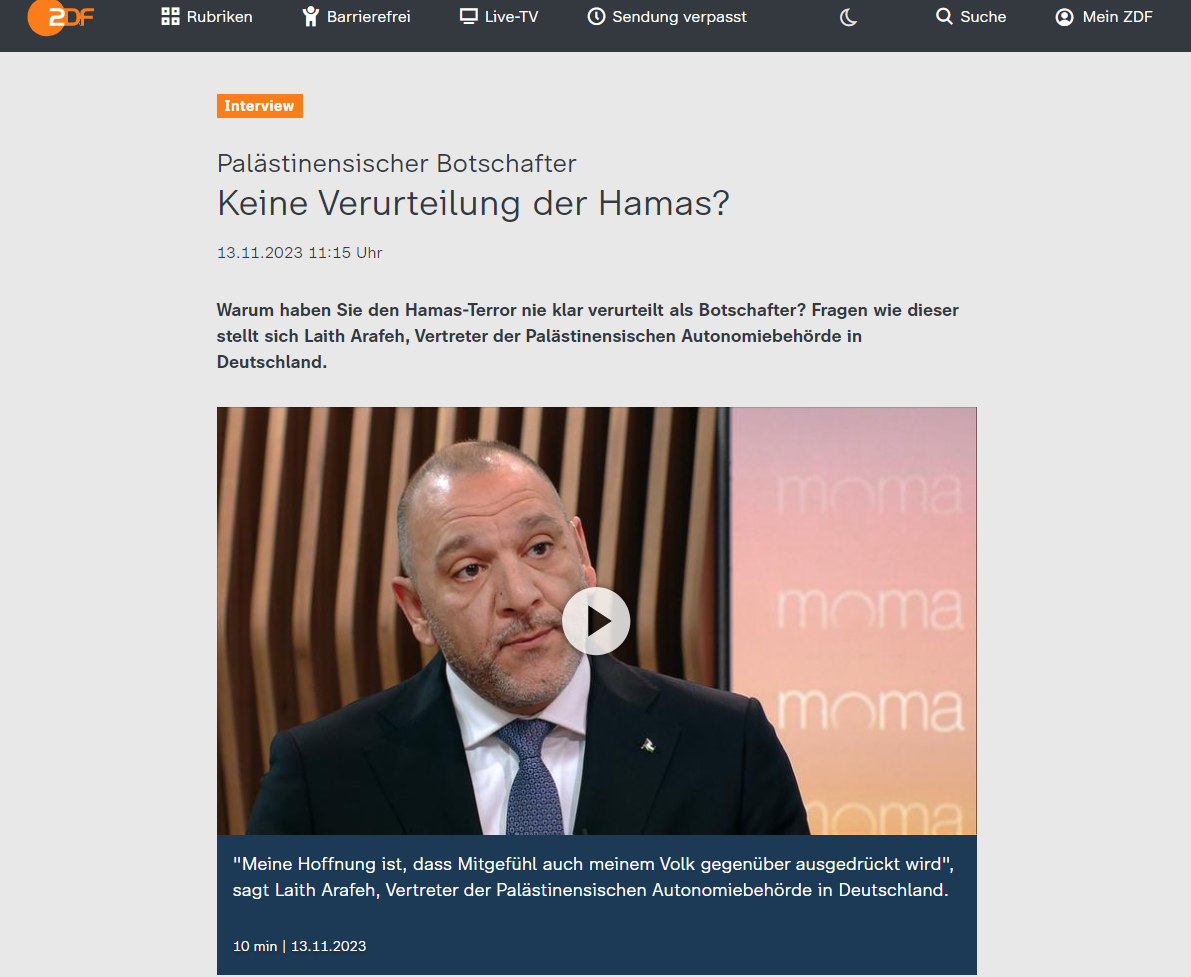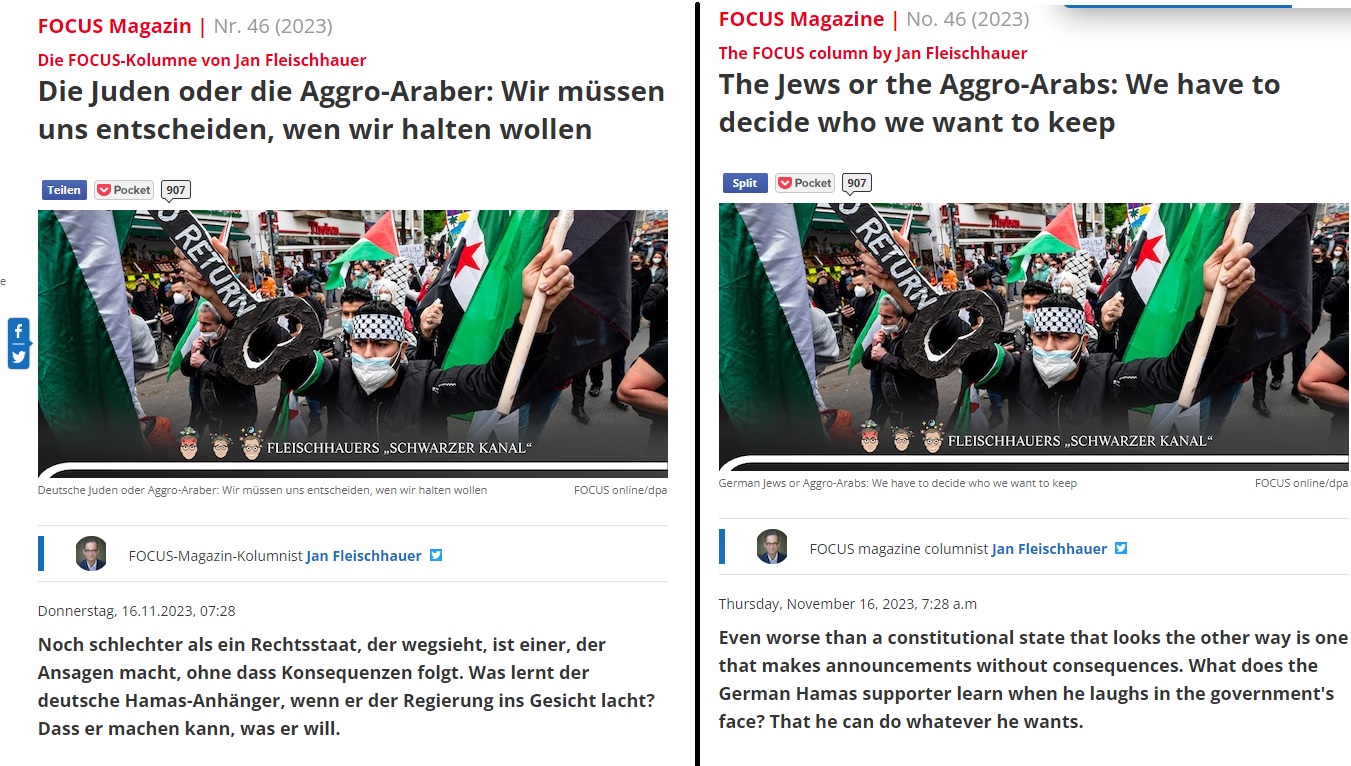For the majority of German media outlets covering the war on Gaza, their news narrative begins with what the Israeli army announces. It does not necessarily end with the statements of other parties, even if they come from the United Nations or other entities critical of Israeli propaganda. This trend is particularly pronounced when it comes to breaking news reported by television, radio, and newspapers.
Rarely does the news reflect what Hamas says about the humanitarian situation in Gaza when it comes from the government of Hamas and its civil entities. Additionally, it is rare for the news to include any response from Hamas to Israeli allegations regarding military affairs and the situation of the fighting inside Gaza. If mentioned at all, the response is usually minimal compared to the space given to Israel, making German media outlets generally echo Israeli propaganda and treat it as sacred.
Public channels are engaged in bias
One notable example is the link to live coverage provided by "Tagesschau," a part of the public media group "ARD." This link, posted on the "X" platform (formerly Twitter), features an unchanging image of the Israeli flag since the beginning of the war on October 7th. The website management repeatedly shares this link on the "X" platform without updating the image. This aligns with the official German stance, which fully supports Israel to the extent that German Chancellor Olaf Scholz, in contrast to most countries worldwide, insists on refusing a ceasefire in Gaza.
The website relentlessly criticizes Hamas and describes what it says as "propaganda." However, it is rare to find any criticism of Israel on the website, despite the thousands of casualties in the Israeli bombardment of Gaza. Even when criticism is presented, it is often attributed to other parties, such as Turkish President Recep Tayyip Erdogan or the United Nations, while ensuring Israel's right to respond.
And when it comes to the coverage of Hamas responses on the website, it is usually to vilify them. In an article titled "Hamas in Lebanon: Where Propaganda and Lies Find Plenty of Echo", German journalist accuses Hamas of controlling public discourse in Middle Eastern media. He writes in his report: "One of the most intolerable things in these evil times is that the grotesque distortion of facts, propaganda, and lies finds a stunning response in the Arab world."
The website accuses Hamas of spreading lies and propaganda, while there is little to no critical evaluation of Israeli actions, despite the alarming number of civilian casualties in the Israeli bombings in Gaza. Additionally, a quick mention of any such criticism of Israel is made alongside an extensive mention of Israel's narrative, further highlighting the bias and unbalanced reporting in German media.
This reporting disparity is especially evident when it comes to giving space to representatives from each side. While Israeli officials are given ample opportunities to speak fully in German public channels, including Israeli army officials, the Palestinian side is scarcely represented, even if they are officials from the Palestinian Authority.
Torsten Menke, a philosophy professor at Northwestern University in Qatar, shared a video from the second German television channel, ZDF, belonging to the public broadcasting corporation, which featured a spokesperson from the Israeli army. Menke said, "The channel interviews a spokesperson for an army that commits war crimes without critical evaluation or consultation with international law experts and without considering the need to protect civilians according to the Geneva Conventions."
While the Israeli side is granted full opportunities to speak, the channel recently hosted Leith Arafa, the representative of the Palestinian Authority in Berlin, with a segment titled "The Palestinian Ambassador... No Condemnation of Hamas?" The entire interview focused on the necessity for the ambassador to condemn Hamas, despite the interview taking place on November 13, well after the number of martyrs in Gaza had exceeded 11,000 due to Israeli airstrikes.

The reporter for ZDF, the most-watched channel in Germany, covers the events in Gaza through embedding with the Israeli military. Most German media outlets no longer have reporters inside Gaza; instead, they report events in Gaza and the occupied West Bank from their offices in Tel Aviv.
The reporter does not hide her bias in favor of the Israeli narrative, as she recently shared a tweet containing an article accusing German leftists who support the Palestinian cause of "glorifying Hamas terrorism as a form of resistance against imperialism." The article features Germans wearing Palestinian kufiya scarves, which is a symbol of the Palestinian cause.
Permissible Racism Against Arabs
One article that sparked controversy was a column written by a German journalist, Jan Fleischhauer, known for his racist views, published on the Focus website. The article was titled, "Jews or Aggressive Arabs... We Need to Decide Which Ones We Want to Keep."
The article included the statement, "I haven't seen any opinion polls yet on how Germans feel about 'Free Palestine' demonstrations, but I doubt that if they saw what young people who climbed a fountain in Berlin to raise their flag (the Palestinian flag) did, some Germans would say to themselves, 'We have nothing to do with them'.

Even some newspapers that were considered reputable have now openly sided with Israel and sought to defend it against criticisms. One such newspaper is 'Zeit,' which recently published an analysis titled 'Who Commits War Crimes in Gaza?'
In the introduction to the article, it was stated that in 'exceptional cases, attacks on civilian targets are justified.' In presenting the report on the 'X' platform, the newspaper chose this paragraph: 'Does Israel violate international law in Gaza? No, say legal experts; even hospitals can be attacked if they are misused by militants.'
Meanwhile, German media outlets that traditionally support Israel are experiencing a state of hysteria, including BILD newspaper, which went so far as to mislead the public about supporters of Palestine during a demonstration. The newspaper falsely accused them of raising the slogan 'Bomb Israel,' when, in fact, the original slogan was 'Germany funds... and Israel bombs.' The newspaper equated ordinary slogans like 'Free Palestine' with hate speech."
The views expressed in this article are the author’s own and do not necessarily reflect the editorial stance of Al Jazeera Journalism Review.




















![Palestinian journalists attempt to connect to the internet using their phones in Rafah on the southern Gaza Strip. [Said Khatib/AFP]](/sites/default/files/ajr/2025/34962UB-highres-1705225575%20Large.jpeg)



















